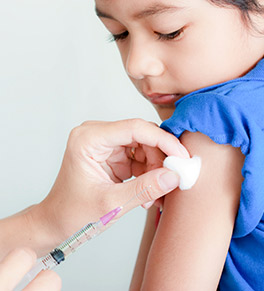Is the COVID-19 vaccine safe for kids?

The low-dose COVID-19 vaccine for kids ages 5 to 11 is both safe and effective, says UCI Health infectious disease expert and pediatrician Dr. Coleen K. Cunningham.
Now that a COVID-19 vaccine has been approved for children ages 5 through 11, parents are wondering if the shots are safe for their little ones.
The pediatric vaccine is not only safe, but necessary, says UCI Health pediatrician Coleen K. Cunningham, MD, after reviewing the clinical trial data of the low-dose Pfizer-BioNTech vaccine.
“I’m absolutely comfortable giving this to children,” says Cunningham, a nationally regarded infectious disease expert who leads the UCI School of Medicine’s Department of Pediatrics and is senior vice president and pediatrician-in-chief for CHOC.
“My own children are grown, but if they were still in this age group, they’d be getting it.”
On Oct. 29, the FDA authorized a kid-sized dose of the Pfizer-BioNTech vaccine for this age group — 10 micrograms vs. 30 micrograms given to those ages 12 and older as a two-shot series three weeks apart. On Nov. 2, the director of the U.S. Centers for Disease Control and Prevention (CDC) gave final approval for its use and White House officials were mobilizing efforts to make the pediatric shots available as early as Nov. 8 for up to 28 million U.S. children.
In the days leading up to the approvals, many parents — including those who are vaccinated themselves — were hesitant, fearing potential side effects and unsure whether the trials of the vaccine in this age group were sufficient.
Wouldn’t it be better to wait for full FDA approval, rather than emergency use authorization, they ask? Besides, since COVID-19 infection in young children has tended to be mild and the pandemic seems to be on the wane, is it even necessary?
Are the studies good enough?
The Pfizer-BioNTech vaccine’s safety was studied in about 3,100 children ages 5 through 11 with no serious side effects detected, according to the FDA. Moreover, it was 90.7% effective in preventing COVID-19 in those children, on par with that of other age groups.
“The immune response in kids was almost identical to prior studies,” Cunningham notes. “Although this study’s design didn’t target efficacy, they found it anyway.”
Because this study data confirms previous findings, a larger sample size of younger children isn’t needed.
“It’s been long-established by the FDA that if there’s a correlate of protection from older age groups, you don’t need to do fully powered efficacy studies,” she explains.
“We have really extensive data from the millions and millions of older kids and adults who have received these products, and this study was designed to look only at immune response and safety.”
What about side effects?
Side effects in the younger children studied were similar to those reported by older age groups, according to the study data.
“Fatigue, headache and just not feeling well,” Cunningham reports. “But in general, the side effects were mild and less frequent than in older groups.”
Although more study data will be forthcoming, no serious adverse effects from the vaccine were reported in this group.
The most serious side-effect documented among 2.5 million people over age 16 who have received the vaccine involved 54 cases of myocarditis — an inflammation of the heart. Those cases were rare and usually mild, although more instances may arise once the pool of people vaccinated increases.
Still, she says, “We don’t need more data to know the vaccine is valuable for children. It’s a 10-microgram dose, and we do know that a lower dose causes fewer side effects.”
Why not wait for full authorization?
One reason the FDA gave only emergency authorization is that the lower-dose regimen has only been studied so far in about 3,000 kids in this age group.
But given its track record in hundreds of millions of people worldwide who have been vaccinated against this deadly virus, Cunningham is confident about its safety and effectiveness in younger children.
“It’s very important for people to get themselves immunized and get their children immunized, because COVID is not a benign infection,” she says.
“We know that it can cause serious illness, death and long-COVID in children. There’s always a small risk with vaccinations, but given what we know about the dangers of COVID-19 and this vaccine’s safety, the benefits clearly outweigh the risks.”
Do young kids even need a vaccine?
COVID-19 cases among children were relatively rare when the pandemic began in March 2020. But as in-classroom instruction resumed and the delta variant circulated, infections among children increased exponentially, accounting for nearly 27% of all U.S. cases, according to the American Academy of Pediatrics.
To date, 172 children ages 5 to 11 have died of COVID-19 and more than 8,300 have been hospitalized, the CDC reports.
Like most U.S. health experts, Cunningham believes COVID-19 will circulate among us for a long time to come, and that vaccines are the best way to prevent or blunt the most severe symptoms of the disease for everyone.
"By decreasing the number of children who get it, we’ll decrease the total number of cases in all age groups,” she says. “Eventually everybody will either be vaccinated against COVID or they’ll get the disease. But as more people are vaccinated, we’ll get to the point where we can get back to normal life.”





